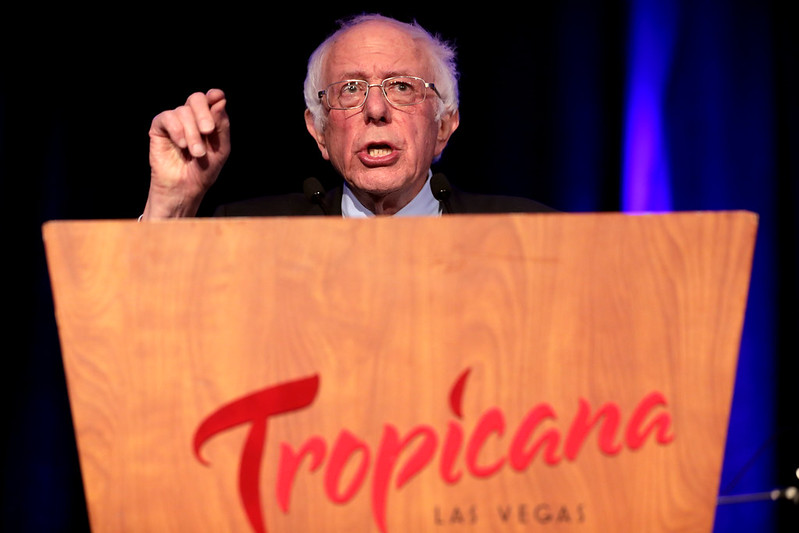Photo Credit: Gage Skidmore || Unless things change, Democratic Party Elites should get comfortable with Sanders being their nominee for President
This is a rare post on politics at Aleph Blog. I am not taking a position on any candidate here, nor their effect on the economy. As an applied mathematician, I want to point out the implications of three factors:
- Bernie Sanders is getting roughly 30% of votes in the primaries/caucuses, and the next five split the rest in an uneven way.
- These Democratic contests typically award delegates based on the vote in each area as defined by a state, and the state as a whole. The delegates get split pro-rata to a candidate’s share of the vote in each area if the candidate gets over 15%. It’s a little more complex than that if no one gets more than 15% of the vote, but that’s not likely to happen in 2020.
- If Sanders gets over 35% of all the pledged delegates, it will get increasingly ugly to not give him the nomination the nearer his delegate total gets to 50% of pledged delegates. No one wants a convention where over 1/3 of the delegates feel cheated. If you need examples where there wasn’t cheating, but there were sure a lot of hard feelings, you can think of Ford/Reagan in 1976, Carter/Kennedy in 1980, and Clinton/Sanders last election.
Add in one more bit of data — in an internet age, it is easy to keep a campaign on life support. Candidates with low funds can nominally hold on for a long time subsisting off of what free media and a skeleton staff can give them.
I ran a few simple simulations yesterday. With six main candidates altogether, if Sanders gets 30% of the vote on average, and the other five split the rest in a lopsided way, on average Sanders will end up with roughly 45% of all of the delegates. But suppose one of Sanders’ opponents drops out, and the other assumptions remain similar — Sanders would get 36% of the delegates. If one more opponent drops out, the effect is a lot smaller — Sanders would get 33% of the delegates.
The most unlikely assumption not to change is that Sanders doesn’t pick up support from voters when opponents of his drop out, particularly if the ones dropping out would be Warren or Buttigieg. I would expect that Sanders might pick up more support if one of them dropped out, as opposed to Biden, Bloomberg or Klobuchar.
But the main effect going on here is with so many opponents to Sanders splitting the remaining votes, few of them get above the 15% threshold, and Sanders gets a decidedly higher allocation of delegates than what he got in the popular vote — not as big of a difference as in the GOP’s winner-take-all primaries, but this is still a considerable advantage unless one of his challengers breaks out of the pack.
Thus, when I read an article like No,?You?Drop Out: Why Bernie?s Rivals Are All Stubbornly Staying in the Race I realize that most of Sanders’ opponents would like others to drop out of the race, but no one sees a decent reason to do so. Everybody thinks it’s nice to get more cars off the crowded highway, as long as it is not them.
Thinking back to 2012 when I wrote Searching for the Not-Romney, I noted how virtually every GOP candidate had had a surge and fall versus Romney. After each surge, there wasn’t a second surge. Voters had given them a limited window of time when they reviewed them — they weighed them in the balance, and found them wanting. No second chances.
I don’t think that’s a perfect paradigm. Second chances ARE possible for the opponents of Sanders, but I think they are unlikely. The candidate would have to give voters a reason to think, “Huh, I guess I didn’t understand him right the first time.” Getting a lot of people to change their minds is difficult after a first impression is made. Thus in the present state of matters, I assume that Sanders will be the nominee of the Democrats.
And, since I can’t resist making at least one comment regarding the economic implications of that, yesterday the market went down hard because of the coronavirus, something that I think is transitory, and should have little effect. Perhaps the drop was due to Sanders’ convincing win in Nevada. That would certainly have more effect on the economy, particularly profits, for a longer period of time.
It might be wise to check your risk position, and ask yourself whether you feel comfortable given an increased likelihood of Sanders being the next President of the USA.
All for now.


What do you expect Sanders to be able to do as President? Seems like he would not have the support of congress for a lot of his policies.
The same conditions that elect Sanders might also elect a more liberal Congress. Also, with the expansion of administrative fiat, it is harder to say what a President can and can’t do. Really, I don’t know, but I would rather not find out.